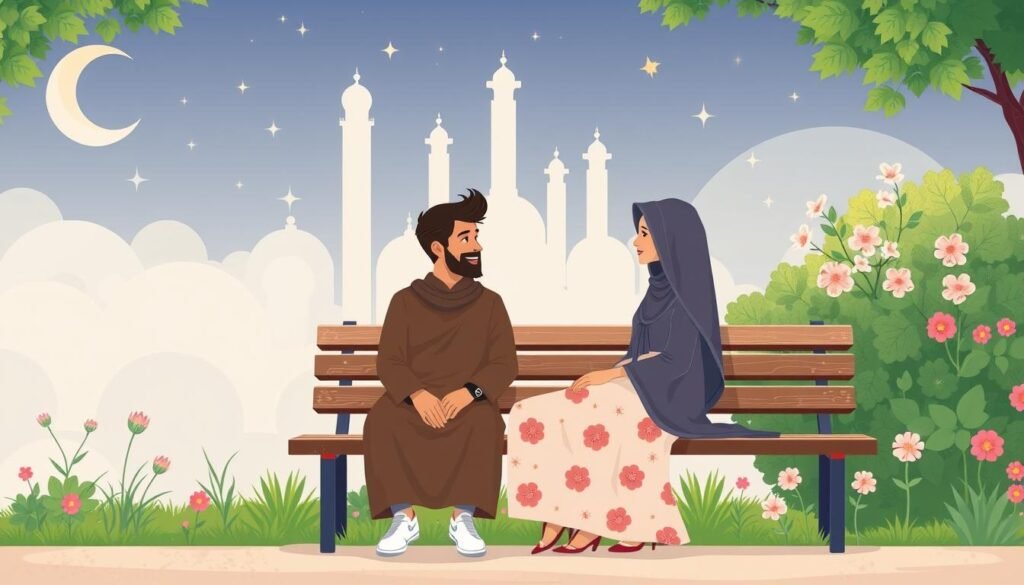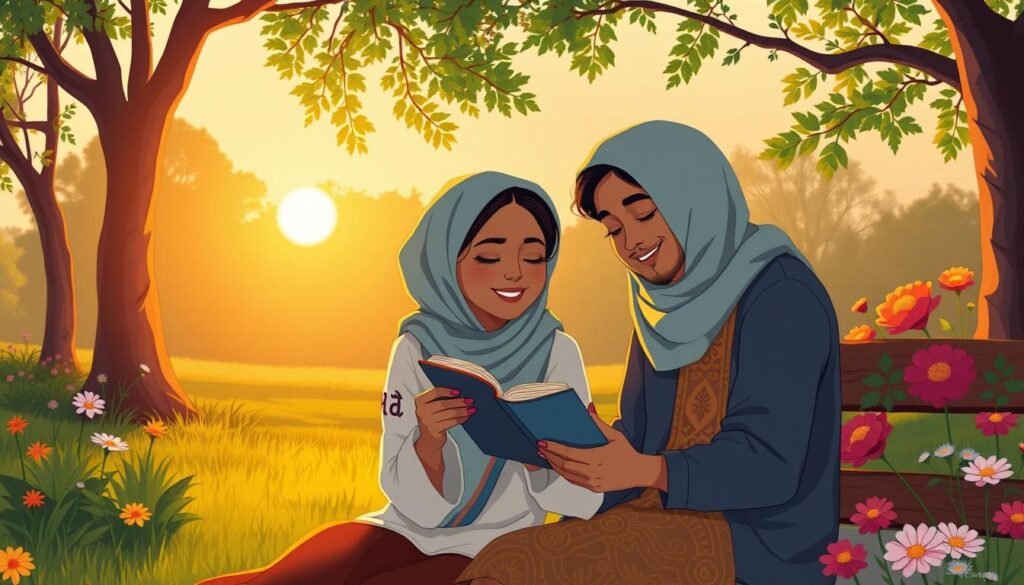Love and relationships ask if boundaries truly limit our connections or just block our way. As our world connects more, dating a Muslim challenges old ideas about love and marriage. About 10% of Muslim women marry outside their faith, raising questions about these unions.
How do Islamic laws affect these relationships? What parts do faith and culture play in these connections?
This article explores the complex sides of interfaith dating. We’ll look at the Islamic view on these relationships and the cultural settings they’re in. By understanding these nuances, we can have meaningful talks that respect both Islamic teachings and diverse backgrounds.
Let’s start this journey together. We’ll explore the depths of love and commitment in a world that keeps changing its views on faith.
Understanding Interfaith Relationships
Interfaith relationships are changing, thanks to cultural diversity. More Muslims and non-Muslims are getting married, like in Canada. They face unique challenges that show the need for respect and understanding.
Challenging perceptions come up in communities, like worries about religious conflicts. Islamic law lets Muslim men marry outside their faith, but limits Muslim women. This raises questions about children’s upbringing in interfaith families.
Some Islamic scholars want to change old rules on interfaith marriage. They argue for more freedom and love, against old patriarchal rules. This shift helps interfaith couples focus on what they share, not just their differences.
But, cultural and social pressures add to the challenges, in places with strict laws. Overcoming these needs deep thought and commitment from both partners. With understanding and teamwork, interfaith couples can build strong, loving bonds.
Religious Views on Dating Across Faiths
Religious views on dating show the deep faith of different beliefs. Each faith has its own way of dealing with relationships. This affects how people date, even when they follow different religions.
In Islam, rules for dating outside the faith are clear. The Qur’an and Sunnah say Muslims can’t marry non-Muslims, except for some cases. This rule is to keep Muslims close to their faith.
Christianity and Judaism see dating in their own ways. They focus on finding someone who shares their values. This helps keep relationships strong and true to their beliefs.
When people from different faiths date, they face big challenges. They must respect each other’s beliefs, even when they disagree. This is key to a good relationship.
Interfaith couples must think about their faiths and what they expect. Scholars warn Muslim men to think carefully before marrying outside their faith. This is to protect their and their children’s Islamic identity.
Understanding different faiths can help make dating across religions better. It’s a way to build bridges and improve relationships.
Can A Non Muslim Date A Muslim
Islamic dating rules are complex, mainly when it comes to interfaith relationships. Islamic teachings offer some flexibility, like for Muslim men and women from the “People of the Book.” This includes Christians and Jews. Such unions are more accepted in “Dar-ul-Islam” areas.
But, in “Dar-ul-harb” nations, these relationships might be seen as Mukrooh Tahrimi or even haraam.

The Islamic Perspective on Interfaith Dating
When talking about interfaith dating, it’s key to understand the rules. Marrying a Christian or Jewish woman is only valid in certain situations. The woman’s faith at the time of marriage matters.
Many people get confused about these rules. For example, children from these unions are seen as Muslim. But, there are many debates about these relationships.
Scholars say Muslim men can’t always marry Christian women in non-Muslim countries. Cultural and legal barriers make it hard.
Common Misconceptions About Interfaith Relationships
Many people misunderstand interfaith dating because of misconceptions. The media often doesn’t show the full picture. They miss the variety of opinions in Islamic discussions.
Experts like Dr. Abdul Ghaffar suggest being kind when dealing with Muslim and non-Muslim marriages. They say it’s good to convert to Islam before having kids. This shows a thoughtful approach to interfaith relationships.
For more on the Islamic view of these relationships, check out this in-depth discussion.
Islamic Law and Its Influence on Dating
Islamic personal status laws shape the dating world for Muslims. They strictly control marriage, focusing on interfaith marriages. A Muslim man can marry a non-Muslim woman from Abrahamic faiths like Christianity or Judaism.
This shows how religious rules affect legal matters. But, a Muslim woman can’t marry outside her faith. This limits her to partners who believe in Islam.
Looking into these cultural practices, I see how marriage choices affect respect and understanding in interfaith couples. Prophet Muhammad’s teachings guide many families. They stress the need for shared beliefs in raising children.
Islamic law also bans a Muslim man from marrying women of other religions like Zoroastrianism or communism. This adds complexity to dating.
Legal views on interfaith relationships vary in Muslim-majority countries. This affects not just the acceptance of such relationships but also the pressures couples face. The Quran supports these beliefs and rules, guiding both personal choices and community standards.
Key verses in the Quran, like those in al-Baqarah and al-Maidah, highlight the importance of these marriage rules. They encourage following Islamic values in personal relationships.
Cultural Context of Interfaith Relationships
Cultural acceptance is key for interfaith couples, mainly in Muslim-majority cultures. How much these couples are accepted changes a lot from one country to another. For example, Tunisia and Turkey are more open to interfaith relationships.
But, places like Saudi Arabia or Afghanistan are much stricter. They often don’t accept relationships outside their faith.
Acceptance isn’t just about religion. It also depends on how a country views different cultures. Things like education and living in cities can help make things better for interfaith couples.
But, there are also strong family and community pressures. These can make it hard for interfaith couples to be together.
Looking at how Muslim-majority cultures handle interfaith relationships shows us the challenges these couples face. The situation is always changing, influenced by many different views.
Interfaith Marriage: What’s Allowed by Islamic Law?
Interfaith marriage rules in Islamic law are a big topic. The Quran says Muslim men can marry women from other faiths, like Jews and Christians. This shows Islamic law allows interfaith marriages under certain conditions.
A Muslim man should choose a partner who shares his faith. This is based on a hadith that lists reasons for marriage, including faith. But, Muslim women can’t marry non-Muslim men, as most scholars agree.
This rule comes from old worries about wives converting and changing Muslim numbers. It also reflects old views on women’s roles and rights. These views were shaped by a time when women had little education or work.
Interfaith marriages can be complex, with issues like different religious practices and raising children. Legal cases show the tension around these marriages. For example, a Catholic man couldn’t marry a Muslim woman because of laws.
Looking into Islamic marriage rules shows a complex area. It’s shaped by history but needs ongoing updates. The Quran supports religious freedom, even for a Christian wife not to convert.
Understanding interfaith marriage helps people deal with its challenges. It’s about respecting different cultures and laws while staying true to one’s faith.
The Role of ‘People of the Book’ in Muslim Relationships
The term “People of the Book” is key in talks about interfaith marriages. It includes Christians and Jews. This term lets Muslim men marry chaste women from these faiths.
Knowing about Kitabia helps us see how this affects Muslim families. It shows the good and bad sides of interfaith relationships in Muslim communities.
Understanding KITABIA and Its Implications
Marriage to a Kitabia can bring both chances and problems for Muslim families. Islamic teachings often suggest marrying within the faith. But, there are exceptions for Muslim men to marry People of the Book.
This leads to a deeper look at how Muslim marriage is affected by culture.
For Muslim women, marrying outside their faith can be risky. It might affect their faith and how they practice it. There could be disagreements over raising children and following Islamic traditions.
The Quran warns about the challenges of interfaith marriages. It stresses the importance of sticking to Islamic values.
In today’s world, interfaith relationships are common, thanks to cultural changes. The People of the Book classification helps us understand these complex issues. It shows a balance between keeping to religious beliefs and the changing nature of love and relationships.
Challenges Faced by Interfaith Couples
Being in an interfaith relationship can be tough. It’s filled with challenges like family expectations and cultural barriers. Each couple brings their own religious and cultural backgrounds together. This mix can lead to a lot of pressure and worries.
Families are a big part of these challenges. Relatives’ expectations can weigh heavily on couples. They struggle to find common ground despite their different beliefs.
Family Expectations and Cultural Barriers
Interfaith relationships often face cultural challenges. Families often want their children to marry within their faith. This can cause conflict and anxiety for couples.
In some cases, getting both parents’ approval is key. Couples might deal with issues like dowry payments and religious ceremonies. These can add to the stress. Some couples face disownment or social ostracism if they don’t meet traditional expectations.
Societal norms also play a big role. In places like Egypt, interfaith marriages have legal hurdles. Christian women marrying Muslim men need church approval. This can make family dynamics even harder.
Personal safety is another concern. Some couples choose to separate to avoid family backlash. Their stories show the tough journey of love and cultural barriers. They must face deep beliefs while building their relationship.
Experiences from Interfaith Couples
Interfaith couples share stories of love and challenge. Their tales show the ups and downs of such unions. Love and respect are common, but cultural and religious hurdles are also faced.
Muslim women in these marriages often face Islamophobia. They talk about the struggles of raising kids according to Islamic ways. Their stories give us a peek into their lives under societal pressure.
Many Muslim women say they don’t push their partners to convert. This shows a change in how people see love and faith in relationships. It’s about personal connection over strict rules.

More and more people are getting married across faith lines, like in Canada. Couples share how they build a life together. They stress the need for honesty and shared values.
Looking at these experiences teaches us about respect and understanding. Their stories help us see the beauty of diverse faith relationships. They show us how to connect better with others.
Advice for Non-Muslims Interested in Muslim Partners
Starting a relationship with a Muslim can be both rewarding and challenging. It’s important to understand and respect their religious beliefs. Open communication and a real interest in their faith are key.
Being well-informed helps build trust and harmony. This is important for any relationship.
Respecting Religious Boundaries and Practices
When dating a Muslim, some tips are helpful. Start by talking openly about faith and practices. This helps you understand each other better.
The Qur’an has rules about interfaith marriages. For example, Muslim men can marry Christian or Jewish women under certain conditions. But Muslim women can’t marry non-Muslim men to keep their faith.
Respecting each other’s beliefs is essential. Being open and willing to learn about Islamic values can strengthen your bond. Finding common ground is important for a lasting relationship.
Consider talking to an Imam if you have questions. His advice can help you understand your situation better.
In any relationship, respectful dialogue is key. Remember, not all Muslims agree on interfaith dating. Always be patient and respectful of each other’s views.
Future of Interfaith Relationships in Modern Society
Looking at the future of interfaith relationships, we see big changes. Our world is getting smaller, and technology is helping us talk more. This means we’re learning to accept love in different ways.
Old ideas are being questioned as we share our stories. This is making us rethink what matters in our relationships.
Studies show that being from the same faith doesn’t always mean a happy marriage. But, when people talk openly about their beliefs, they can make it work. This shows that respect and understanding are key in interfaith relationships.
In the future, we might see more interfaith marriages. This is true, even among Muslim women who want to marry someone from another faith. It’s not just a trend; it’s a sign of a changing world that values everyone.
As interfaith couples blend their traditions, they open doors for others. They show us that we can be who we are, without being tied to just one faith. This is a big step towards unity.
FAQ
Can a non-Muslim date a Muslim?
What are the Islamic perspectives on interfaith dating?
Are there misconceptions surrounding interfaith relationships?
How does Islamic law influence dating practices among Muslims?
What is the concept of ‘People of the Book’?
What challenges do interfaith couples face?
How can non-Muslims approach dating a Muslim partner?
What is the future of interfaith relationships in today’s society?

Embracing Faith, One Insight at a Time!
The teachings of the Quran have always guided my path. With a deep passion for Islamic knowledge, I strive to blend the wisdom of tradition with the relevance of today, making the timeless messages of Islam accessible and meaningful for everyone.
Muslim Culture Hub is my platform to share historical insights and thought-provoking articles, exploring both well-known and lesser-discussed aspects of Islamic culture and beliefs. My mission is to create an inclusive online space where everyone can learn, strengthen their faith, and connect with the profound message of Islam.
Join the journey!
May peace be upon you.








